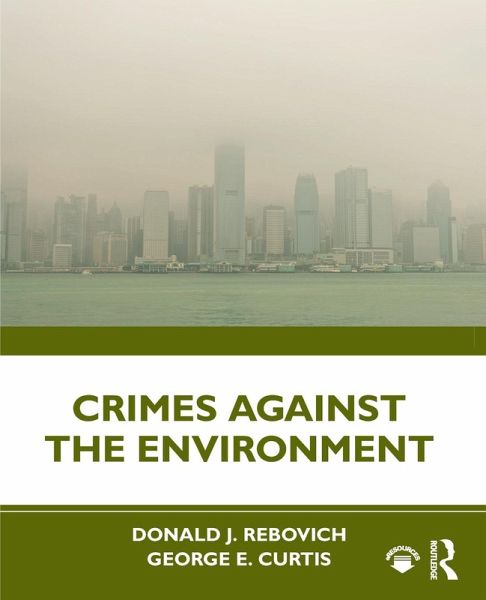
Donald J. Rebovich (Utica College, New York, USA)George E. Curtis (Utica College, New York, USA)
Broschiertes Buch
Crimes Against the Environment
Versandkostenfrei!
Versandfertig in 1-2 Wochen

PAYBACK Punkte
33 °P sammeln!




The book, from the perspective of law and criminology, centers on environmental crime, its commission, the types of entities that commit it, the laws enacted to prohibit it, how it is committed and effective means to control and prevent it.
Donald J. Rebovich, Ph.D., Distinguished Professor of Criminal Justice at Utica College, Utica, N.Y., is the Director of Financial Crime Programs at the College. Dr. Rebovich is also the Executive Director of the Center for Identity Management and Information Protection (CIMIP) of Utica College. Prior to Utica College, Dr. Rebovich served as the Research Director for the National White Collar Crime Center (NW3C) and the National District Attorneys Association (NDAA). At NW3C he was responsible for directing the national analysis of Internet crime report data generated by the FBI's Internet Fraud Complaint Center, and directing the National Public Survey on White Collar Crime program. He is co-author of "Identity Fraud Trends and Patterns: Building a Data-Based Foundation for Proactive Enforcement," a national study of U.S. Secret Service identity theft cases covering a six-year period. He is also the author of Dangerous Ground: The World of Hazardous Waste Crime, which presented the results of the first empirical study of environmental crime and its control in the United States. Most recently, he co-edited a text entitled The New Technology of Crime, Law and Social Control. His background includes research in identity crime characteristics, economic crime victimization, white collar crime prosecution, protected health information, human trafficking, and multijurisdictional task force development. George E. Curtis is Professor Emeritus of Criminal Justice at Utica College, Utica, N.Y. He previously served as the Dean of the School of Business and Justice Studies, Executive Director of the Economic Crime Institute of Utica College, and as Director of Economic Crime Programs at the College. He received a Bachelor of Arts degree from Syracuse University in 1964 and a Juris Doctor degree from Brooklyn Law School in 1967. He is an attorney admitted to the Bar of the State of New York. Curtis served as a confidential law clerk in the New York court system for more than 26 years and is a former President of his local bar association and a former delegate to the New York State Bar Association's House of Delegates. Professor Curtis is the author of The Law of Cybercrimes and Their Investigation, which was published in August 2011 by CRC Press, and is a co-author, with R. Bruce McBride, of a college text on Proactive Security Administration, published by Pearson Prentice Hall. Professor Curtis currently teaches undergraduate law-related courses in economic crime and cybercrime.
Produktdetails
- Verlag: Taylor & Francis Inc
- Seitenzahl: 142
- Erscheinungstermin: 27. Oktober 2020
- Englisch
- Abmessung: 235mm x 191mm x 8mm
- Gewicht: 276g
- ISBN-13: 9781498754866
- ISBN-10: 1498754864
- Artikelnr.: 60005525
Herstellerkennzeichnung
Libri GmbH
Europaallee 1
36244 Bad Hersfeld
gpsr@libri.de
Für dieses Produkt wurde noch keine Bewertung abgegeben. Wir würden uns sehr freuen, wenn du die erste Bewertung schreibst!
Eine Bewertung schreiben
Eine Bewertung schreiben
Andere Kunden interessierten sich für













